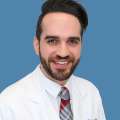Cardio-Oncology
The cardio-oncology team provides expert treatments and researches new therapies. Our program has achieved international recognition for our effective, collaborative care.

Why choose UCLA Health for cardio-oncology care?
As cancer treatments improve, more people are living long, active lives during and after cancer treatment. But some cancer treatments can have short- or long-term effects on the heart, a condition known as cardiotoxicity.
Cardio-oncologists treat patients with heart and vascular problems resulting from cancer therapies. At UCLA Health, our cardio-oncology team provides compassionate, comprehensive care.
Highlights of our cardio-oncology program include:
- International recognition: Our program is an International Cardio-Oncology Society Gold Center of Excellence. This recognition highlights our commitment to providing exceptional, multispecialty cardio-oncology treatment.
- Team approach: Effective heart care for people with cancer requires a collaborative approach. Our cardiologists and oncologists work closely to ensure you get the treatment you need. When needed, you can access the full array of advanced, subspecialty cardiology services, including advanced heart failure experts, adult congenital heart disease cardiologists, interventional cardiologists and electrophysiologists.
- Research emphasis: Our doctors are members of national and international research collaborations advancing the field of cardio-oncology. We work with other researchers to identify new heart problems and establish treatment guidelines. Patients may have access to promising new therapies through clinical trials.
What is cardio-oncology?
Cardio-oncology is a subspecialty of cardiology that focuses on the cardiovascular needs of patients with cancer. Our team cares for people before, during and after cancer treatment, including those who:
- Need cancer treatment and already have heart disease or cardiac risk factors
- Develop heart disease while undergoing cancer treatment
- Develop heart disease after finishing cancer treatment
Because cardiotoxicity may develop years after cancer treatment, we provide follow-up care throughout cancer survivorship. Care may include:
- Individualized cardiovascular risk assessments
- Monitoring for long-term cardiovascular effects
- Management of cardiovascular effects of chemotherapy, immunotherapy or radiation therapy
Cardio-oncology conditions we treat
We offer therapies to help lower the risk of or treat cardiotoxicity. Some of the most common heart problems that arise because of cancer treatments include:
- Arrhythmias: Arrhythmias are irregular heart rhythms.
- Cardiac tumors: Cardiac tumors are irregular growths that start in heart tissue. We work with oncologists to manage the effects on the heart during cancer treatment.
- Coronary artery disease: Coronary artery disease happens when a fatty substance (plaque) builds up in the blood vessels supplying blood to the heart (coronary arteries).
- Heart failure: Heart failure occurs when the heart no longer pumps enough blood to meet the body’s needs.
- Pericardial disease: Pericardial disease is inflammation in the pericardium, the sac surrounding the heart.
- Thromboembolism: A thromboembolism happens when a blood clot from one area of the body breaks off and blocks a different blood vessel.
- Valvular disease: Valvular disease is any damage or disease in the heart valves, which open and close to allow blood to flow through the heart.
We often treat cardiovascular complications related to specific cancer therapies, such as:
- Anthracycline-related cardiac dysfunction: Anthracycline is a type of chemotherapy drug that can increase cardiotoxicity risk.
- HER2-targeted therapies: These drugs treat cancers high in HER2 expression, primarily in breast cancer.
- VEGF inhibitors: These drugs treat cancer by inhibiting growth of new blood vessels.
- Immunotherapy: This class of treatments boosts your immune system to help find and attack cancer cells.
- Stem cell transplant: A stem cell transplant is a procedure to replace the stem cells in your bone marrow, the spongy tissue inside bones. Stem cell transplants fight cancers that affect bone marrow, such as multiple myeloma, leukemia or lymphoma.
Tests and treatments we offer
Cardio-oncology treatment varies depending on your needs. Our team offers a full range of services to lower your risk of and treat heart complications, including:
- Risk assessments: We evaluate people before and after cancer treatment to understand their risk of cardiotoxicity or long-term cardiovascular disease. These assessments help us know what monitoring and follow-up treatment may be best for you.
- Cardiac imaging: We use tests such as echocardiograms, stress tests, CT scans and MRIs to monitor you for heart complications. Ongoing monitoring helps us detect problems early, which increases the chances for a good outcome.
- Medications: You may benefit from medications to protect your heart, control your heart rhythm, lower blood pressure, reduce your heart attack risk or prevent blood clots.
- Invasive coronary angiography: Our interventional cardiologists specialize in minimally invasive heart procedures. They insert small tubes called catheters through your blood vessels to access your heart. They may open blocked blood vessels and place stents or replace damaged heart valves.
- Electrophysiology: Electrophysiologists specialize in treating arrhythmias. They may use medications or catheter-based procedures to correct irregular heart rhythms.
- Clinical trial treatments: Our doctors test the newest treatment options to advance the field of cardio-oncology. When appropriate, your care plan could include therapies available through clinical trials.
Meet our team
The UCLA oncology network in California is growing quickly, and we have fantastic doctors at multiple locations. That means you have access to exceptional care close to home. Our doctors are active researchers as well as clinicians who provide exceptional cardio-oncology care. We use advanced tools and the latest effective treatments.
UCLA Cardiology Fellows (2023-2024)

Contact us
Call 310-825-9011 to connect with a cardio-oncologist at UCLA Health.
Find your care
Our experts work together to provide exceptional cardio-oncology care. To learn more about our services, call 310-825-9011.















